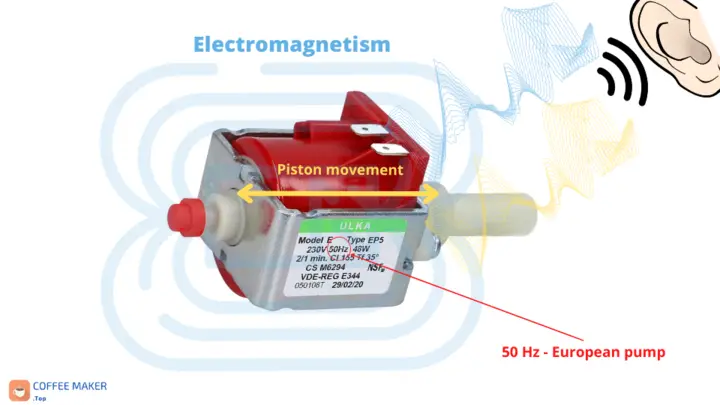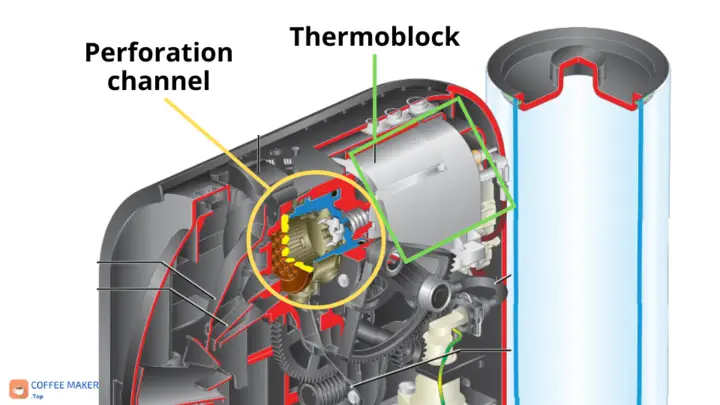Are Nespresso machines noisy? This is the question that many users are asking themselves, contributing to a debate that is increasingly present in discussion forums and specialised blogs in the sector. Nespresso machines have always been accused of being noisy when they do not make much more noise than other capsule coffee machines.
This article will be divided into two main sections; in the first one, we will discuss how noisy Nespresso coffee makers are in good condition (without breakdowns). In contrast, in the other section, we will study why a Nespresso coffee maker can become noisy over time or due to a problem.
How noisy is a Nespresso coffee machine?
In general, all coffee makers are noisy to some extent. However, capsule coffee makers have a particularly bad reputation in terms of noise, and among the worst considered are Nespresso coffee makers. However, this reputation is unfair, as they are no noisier than other capsule coffee makers.
In the following table, we can observe a comparison of 7 Nespresso coffee makers, the noise they make during the preparation of coffee, and the capsule’s perforation when they reach their maximum noise. All values are measured in decibels (dB).
| Model | Coffee Preparation | Maximum |
| Pixie | 62 – 63 dB | 80,7 dB |
| Creatista | 57 – 58 dB | 76,7 dB |
| Latissima | 65 – 66 dB | 75,4 dB |
| Citiz | 58 – 59 dB | 72,2 dB |
| Essenza | 54 – 55 dB | 70,7 dB |
| Vertuo | 65 – 66 dB | 66,6 dB |
| Maestria | 59 – 60 dB | 65,8 dB |
From the results obtained, we can determine that the Pixie coffee machine is the noisiest in terms of peak sound when piercing the capsules and one of the noisiest when brewing coffee.
We can also conclude that, on average, the maximum sound is 72.6 dB and 60.5 dB when brewing coffee. Above 55 dB, any sound is considered annoying, so we can affirm that Nespresso coffee makers are noisy but as noisy as other brands.
What parts of a Nespresso coffee machine produce sound?
When analysing the noise that a Nespresso coffee machine makes, we must begin by analysing which components of the machine produce some sound during the preparation of the coffee. Does it have different components than other capsule coffee machines? Are these components especially noisy?
Like all other coffee makers, the Nespresso has only one component that directly produces sound: the water pump. However, there are other elements of the coffee machines that produce sound indirectly, which are more numerous:
- The thermoblock.
- The injector or capsule perforator.
- The casing of the coffee maker.
- Moving parts.
The sound of the vibrating pump of a Nespresso coffee machine
The water pumps used in Nespresso coffee makers (and all other brands) are called «vibrating pumps» because a piston inside the pump «vibrates,» causing the water to be propelled with sufficient pressure. This vibration is the result of an electromagnetic field generated inside the pump. Therefore, the sound coming from a vibrating pump is threefold:
- On the one hand, the electromagnetic field produces a humming sound.
- On the other hand, the piston produces a hammering sound inside the pump.
- Finally, both combined produce a vibration of the pump.
The pumps of the European Nespresso machines operate at a frequency of 50Hz, i.e., 50 cycles per second. In contrast, the US Nespresso machines operate at 60Hz, i.e., 60 cycles per second. This means that the piston moves 50 or 60 times per second.

To know if the pump is the cause of an increase in the noise of a Nespresso coffee machine, it is necessary to determine if the noise comes from the magnetic field generated, from the internal movement of the piston, or the vibration of the entire pump.
A pump to make little noise must be in the best possible working condition. This is why scale build-up inside is one of the main causes of a water pump becoming louder on hammering and vibration. If the problem stems from the magnetic field, it has to do with the wiring of the machine or the integrity of the pump itself.
The sound of the thermoblock of a Nespresso coffee maker
The thermoblock of Nespresso coffee machines does not produce any noise directly. However, it indirectly produces a noise when the water circulates inside the machine at high pressure and temperature. These sounds are similar to whistling noises, which become more acute when the internal channels of the thermoblock become obstructed, or there is a leak.
The thermoblock in Nespresso coffee machines is located just behind the perforation channel of the capsules, so if there is a loud noise when injecting water into the capsule, the thermoblock could be partly responsible. It is unlikely that the thermoblock is to blame because a Nespresso coffee machine has become particularly noisy.

The sound of the housing of a Nespresso coffee machine
As with the thermoblock, the casing of a Nespresso does not produce any sound by itself, but it does when the pump’s vibrations are transmitted to the outside of the coffee maker. For this reason, it is important to keep the screws of the coffee maker well-tightened and the small rubber bases on the bottom, which absorb a large part of the vibration.
The sound of the moving parts of a Nespresso coffee machine
The reservoir, the capsule tray, and the drip tray are 3 of the biggest causes of unwanted noises in a Nespresso coffee machine and the most ignored of all. When not properly in place, they can produce a terrible noise due to the machine’s vibrations.
Ensuring all moving parts are secure and tight before preparing our coffees is important.
Has your Nespresso machine suddenly become noisy?
With everything we have seen so far, you can, on the one hand, determine if your coffee maker has become noisy by comparing it to the table above and, on the other hand, start investigating where the problem is if it has become noisier than normal.
My advice is to rule out the components that may be causing the noise one by one. Disassembling the coffee maker is a great idea to eliminate factors such as moving parts and the housing and also allows you to closely check the condition of the pump, thermoblock, and other internal components.
To measure the decibels of your coffee maker, you can download any free app on your phone, as you don’t need the measurement to be incredibly accurate, just that you can compare it with the normal sound values for Nespresso coffee makers.
Descaling your Nespresso to reduce noise
Limescale and other sediments build-up inside coffee makers are the most likely cause of most breakdowns, and in the case of noise too. With your decibel measuring app, note how much noise the coffee maker makes, descale and measure again. I am 100% sure you will have managed to lower several decibels.
Related article:
- Krups: Problem-Solving
- Dolce Gusto coffee machine vibration and noise
